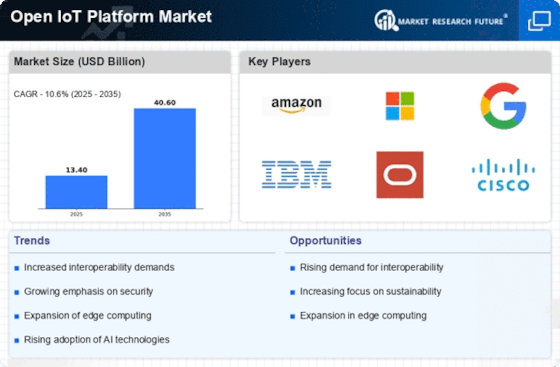Top Industry Leaders in the Open IoT Platform Market
Competitive Landscape of the Open IoT Platform market
The Open IoT Platform market is witnessing a dynamic and ever-evolving competitive landscape. Characterized by diverse players ranging from established tech giants to innovative startups, this market presents both challenges and opportunities for those seeking to capitalize on the burgeoning demand for open, interoperable solutions for connecting and managing the ever-growing network of intelligent devices.
Key Players:
- Cisco Systems Inc. (US)
- Bosch Software Innovations GmbH (Germany)
- Siemens (Germany)
- Wipro Ltd. (India)
- Microsoft Corporation (US)
- Google Inc. (US)
- Oracle Corporation (US)
- com.Inc. (US)
- SAP SE (Germany)
- Huawei Technologies Co.Ltd.
- Intel Corporation (US)
- PTC Inc. (US)
Strategies Adopted by Competitors:
- Specialization: Players are focusing on specific vertical markets like smart cities, healthcare, or manufacturing, tailoring their solutions to address industry-specific challenges and compliance requirements.
- Partnerships and Acquisitions: Building strong ecosystems through partnerships with device manufacturers, software vendors, and system integrators is crucial for expanding reach and offering seamless end-to-end solutions. Acquisitions of smaller players with niche expertise are also increasingly seen.
- Openness and Interoperability: Embracing open standards and promoting interoperable platforms is key to attracting a wider developer base and fostering innovation within the ecosystem.
- Focus on Security and Privacy: With rising concerns about data security and privacy, platforms are investing heavily in robust security features and transparent data governance practices.
Factors for Market Share Analysis
- Platform Capabilities: Breadth and depth of features, scalability, reliability, and ease of use play a significant role in attracting and retaining customers.
- Pricing Models: Flexible and competitive pricing models, including pay-as-you-go options, cater to diverse needs and budgets.
- Deployment Options: Offering both cloud-based and on-premise deployment options addresses specific requirements of different user segments.
- Community and Support: A strong developer community, comprehensive documentation, and robust technical support are crucial for successful platform adoption.
New and Emerging Companies:
The Open IoT Platform market is constantly seeing the emergence of new players with innovative solutions. Companies like HiveMQ, focusing on lightweight messaging protocols for the Industrial Internet of Things (IIoT), and Losant, offering a low-code environment for rapid IoT application development, are making waves with their specialized offerings.
Current Company Investment Trends:
- Investments in Edge Computing: As data processing at the edge becomes increasingly important, platforms are integrating edge computing capabilities to enable faster decision-making and reduced latency.
- Focus on Artificial Intelligence and Machine Learning: Integration of AI and ML algorithms allows platforms to offer data-driven insights, predictive maintenance, and automated device management capabilities.
- Blockchain Adoption: Exploring the potential of blockchain technology for secure data management and tamper-proof provenance tracking is gaining traction within the market.
Latest Company Updates:
-
January 9, 2024: Microsoft Azure IoT announces partnership with Siemens MindSphere to offer pre-built solutions for industrial automation -
January 7, 2024: Eclipse Californium releases version 3.0, featuring enhanced security and performance improvements for low-power IoT devices -
December 15, 2023: Amazon Web Services (AWS) IoT Core expands integration with NVIDIA DeepStream SDK for real-time video analytics in edge computing environments -
December 12, 2023: IBM unveils "Project Ambra," a new open-source initiative for edge-native AI in IoT applications. -
November 29, 2023: Ayla Networks secures USD 80 million in Series D funding to accelerate growth in smart home and connected device platform offerings










